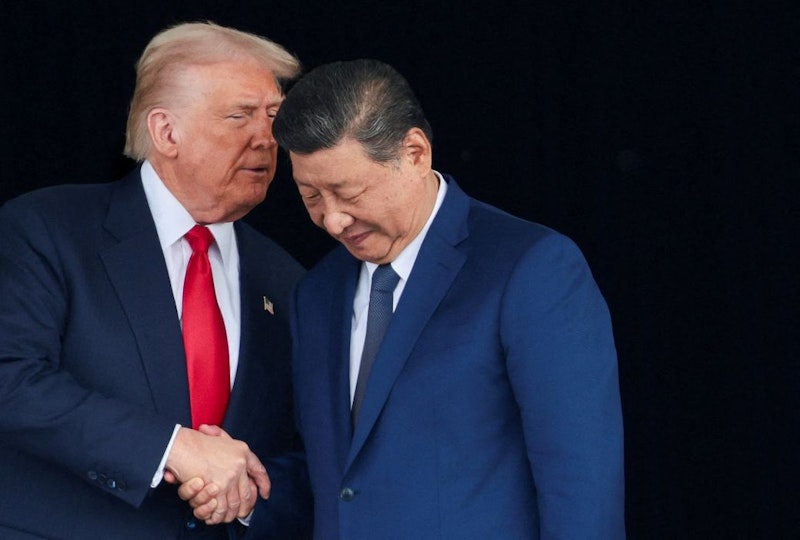El Salvador’s president has what every dictator wishes they had—effortless cool and endless charm. Nayib Bukele looks like he should be fronting a band, not a country. But behind the sunglasses and swagger, he's building the blueprint for a Latin American autocracy in the digital age. At 44, he’s young enough to rule El Salvador for life and savvy enough to make it look like progress.
The self-styled "philosopher king" has social-media clout and a congress that bends at his command. He’s scrapped term limits, swept the courts clean, and stationed the military at the heart of civic life. He’s widened state surveillance, muzzled the press, and recast dissent as disloyalty. Crime has fallen, but the threat has merely changed uniforms, trading gang colors for government suits. Bukele has recast himself from reformer to redeemer, fusing security and obedience into a single political creed. In doing so, he edges closer to becoming Latin America’s Xi Jinping.
For decades, Western strategists believed the world would become more like us—that China would liberalize once it got a taste of capitalism. Instead, the West is becoming more like China. What began as Beijing’s domestic formula for stability—mass surveillance, censorship, and a fusion of corporate power with government authority—has quietly become the global model for control. The Chinese Communist Party built a system that promises prosperity without liberty, security without scrutiny, and obedience without overt brutality. And on paper, it works. That’s what makes it both terrifying and tempting.
From San Salvador to Singapore, leaders have noticed. They’ve seen the efficiency of a population kept compliant through digital tracking, curated information, and patriotic pantomime. The West used to export democracy; now it’s importing discipline. Bukele is simply the first in the region to embrace it so openly.
Many on the right romanticize him as a strongman who gets results. The same crowd swooned for Javier Milei in Argentina, Viktor Orbán in Hungary, and even Putin not that long ago. They see defiance of global elites and think victory; what they’re really seeing is a different kind of cage. From afar, authoritarianism always looks efficient. Up close, it drips with despair. The romance comes from distance—a sort of voyeuristic patriotism, where people cheer for despots the way they cheer for bad boys in movies. It’s easy to swoon over the strongman when he’s not the one locking you up.
Bukele tweets like a millennial but governs like a monarch. His digital persona—a mix of strategic reformer and streetwise savior—hides a machinery of power that never turns off. Journalists are spied on, courts are cleared of critics, and political rivals are reduced to cautionary tales. The man’s brilliance lies in his branding. He’s managed to turn submission into stagecraft, autocracy into aesthetics. El Salvador now resembles a tech startup run by a CEO who’s convinced he’s been chosen by history.
And yet, from a realist’s perspective, his rise makes sense. The world’s tired of disorder. People crave predictability, even if it comes with a price tag. For governments, the Chinese model offers a seductive bargain: control the flow of information, promise stability, and keep the streets quiet. No pesky legislatures, no media storms, no rallies turning into riots. The trade-off is the soul of a nation. But for bureaucrats and technocrats, souls are inconvenient.
Western governments, once the guardians of liberty, are learning the lesson too well. During crises—pandemics, protests, wars—they discovered the allure of lockdown logic. The idea that citizens should comply “for their own good.” Bukele simply skipped the pretense.
But there’s a difference between order and ossification. Nations thrive when people are trusted to act, speak, and think freely. The best societies function not through dominance but dignity. The true, restless kind that sparks art, innovation, and conscience. Every authoritarian system begins by promising Heaven and ends by dragging citizens to Hell.
Bukele’s admirers applaud his results, but they mistake control for competence. The streets may be safer, but the spirit’s smaller. And once obedience becomes habit, it’s hard to remember what courage felt like. The right, in its hunger for strength, too often confuses tyranny with toughness. Bukele, Milei, Orbán—each one hailed as a savior of sorts. But they’re not. They’re symptoms of a world losing faith in its people.
The lesson isn’t to envy the efficiency of autocrats but to restore the confidence of democracies. Freedom’s harder. It’s slower, uglier, and infinitely more human. It allows for argument, dissent, even failure—things that no algorithm or dictator can tolerate. But it allows for grace, humor, and the untamed brilliance that tyranny can never manufacture.

